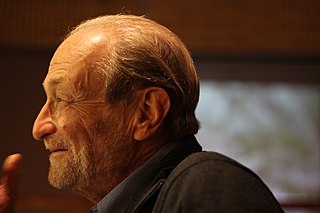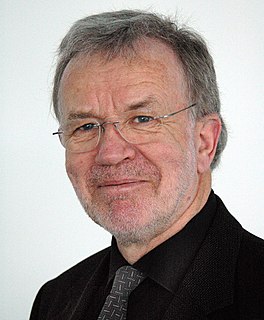Related Research Articles

Cognitive science is the interdisciplinary, scientific study of the mind and its processes with input from linguistics, psychology, neuroscience, philosophy, computer science/artificial intelligence, and anthropology. It examines the nature, the tasks, and the functions of cognition. Cognitive scientists study intelligence and behavior, with a focus on how nervous systems represent, process, and transform information. Mental faculties of concern to cognitive scientists include language, perception, memory, attention, reasoning, and emotion; to understand these faculties, cognitive scientists borrow from fields such as linguistics, psychology, artificial intelligence, philosophy, neuroscience, and anthropology. The typical analysis of cognitive science spans many levels of organization, from learning and decision to logic and planning; from neural circuitry to modular brain organization. One of the fundamental concepts of cognitive science is that "thinking can best be understood in terms of representational structures in the mind and computational procedures that operate on those structures."

Cognitive psychology is the scientific study of mental processes such as attention, language use, memory, perception, problem solving, creativity, and reasoning.
ACT-R is a cognitive architecture mainly developed by John Robert Anderson and Christian Lebiere at Carnegie Mellon University. Like any cognitive architecture, ACT-R aims to define the basic and irreducible cognitive and perceptual operations that enable the human mind. In theory, each task that humans can perform should consist of a series of these discrete operations.
The cognitive revolution was an intellectual movement that began in the 1950s as an interdisciplinary study of the mind and its processes. It later became known collectively as cognitive science. The relevant areas of interchange were between the fields of psychology, linguistics, computer science, anthropology, neuroscience, and philosophy. The approaches used were developed within the then-nascent fields of artificial intelligence, computer science, and neuroscience. In the 1960s, the Harvard Center for Cognitive Studies and the Center for Human Information Processing at the University of California San Diego were influential in developing the academic study of cognitive science. By the early 1970s, the cognitive movement had surpassed behaviorism as a psychological paradigm. Furthermore, by the early 1980s the cognitive approach had become the dominant line of research inquiry across most branches in the field of psychology.

Jacques Mehler was a cognitive psychologist specializing in language acquisition.
Ellen Bialystok, OC, FRSC is a Canadian psychologist and professor. She carries the rank of Distinguished Research Professor at York University, in Toronto, where she is director of the Lifespan Cognition and Development Lab, and is also an associate scientist at the Rotman Research Institute of the Baycrest Centre for Geriatric Care.
Brian James MacWhinney is a Professor of Psychology and Modern Languages at Carnegie Mellon University. He specializes in first and second language acquisition, psycholinguistics, and the neurological bases of language, and he has written and edited several books and over 100 peer-reviewed articles and book chapters on these subjects. MacWhinney is best known for his competition model of language acquisition and for creating the CHILDES and TalkBank corpora. He has also helped to develop a stream of pioneering software programs for creating and running psychological experiments, including PsyScope, an experimental control system for the Macintosh; E-Prime, an experimental control system for the Microsoft Windows platform; and System for Teaching Experimental Psychology (STEP), a database of scripts for facilitating and improving psychological and linguistic research.
Lawrence W. Barsalou is an American psychologist and a cognitive scientist, currently working at the University of Glasgow.
Trevor Harley is emeritus chair of Cognitive Psychology. His primary research is in the psychology of language. From 2003 until 2016 he was Head and Dean of the School of Psychology at the University of Dundee, Scotland, United Kingdom. He is author of "The Psychology of Language", currently in its fourth edition, published by Psychology Press, and "Talking the talk", a book about the psychology of language (psycholinguistics) aimed at a more general audience.

Wolfgang Prinz is a German cognitive psychologist. He is the director of the Max Planck Institute for Human Cognitive and Brain Sciences in Leipzig, Germany, and an internationally recognized expert in experimental psychology, cognitive psychology and philosophy of mind. He is the founder of the common coding theory between perception and action that has a significant impact in cognitive neuroscience and social cognition.

Laura-Ann Petitto is a cognitive neuroscientist and a developmental cognitive neuroscientist known for her research and scientific discoveries involving the language capacity of chimpanzees, the biological bases of language in humans, especially early language acquisition, early reading, and bilingualism, bilingual reading, and the bilingual brain. Significant scientific discoveries include the existence of linguistic babbling on the hands of deaf babies and the equivalent neural processing of signed and spoken languages in the human brain. She is recognized for her contributions to the creation of the new scientific discipline, called educational neuroscience. Petitto chaired a new undergraduate department at Dartmouth College, called "Educational Neuroscience and Human Development" (2002-2007), and was a Co-Principal Investigator in the National Science Foundation and Dartmouth's Science of Learning Center, called the "Center for Cognitive and Educational Neuroscience" (2004-2007). At Gallaudet University (2011–present), Petitto led a team in the creation of the first PhD in Educational Neuroscience program in the United States. Petitto is the Co-Principal Investigator as well as Science Director of the National Science Foundation and Gallaudet University’s Science of Learning Center, called the "Visual Language and Visual Learning Center (VL2)". Petitto is also founder and Scientific Director of the Brain and Language Laboratory for Neuroimaging (“BL2”) at Gallaudet University.
Ping Li is a Professor of Psychology, Linguistics, and Information Sciences and Technology at Pennsylvania State University. He specializes in language acquisition, focusing on bilingual language processing in East Asian languages and connectionist modeling. Li received a B.A. in Chinese linguistics from Peking University in 1983, an M.A. in theoretical linguistics from Peking University, a Ph.D. in psycholinguistics from Leiden University and the Max Planck Institute for Psycholinguistics in 1990, and completed post-doctoral fellowships at the Center for Research in Language at the University of California, San Diego and the McDonnell-Pew Center for Research in Cognitive Neuroscience in 1992. Li has been employed at the Chinese University of Hong Kong (1992–1996), the University of Richmond (1996–2006), and Pennsylvania State University (2008–present), and he has also served as a Visiting Associate Professor at Hong Kong University (2002–2003), an adjunct professor at the State Key Laboratory for Cognitive Neuroscience and Learning at Beijing Normal University (2000–present), as well as Program Director for the Perception, Action, and Cognition Program and the Cognitive Neuroscience Program at the National Science Foundation (2007–2009).

Some of the research that is conducted in the field of psychology is more "fundamental" than the research conducted in the applied psychological disciplines, and does not necessarily have a direct application. The subdisciplines within psychology that can be thought to reflect a basic-science orientation include biological psychology, cognitive psychology, neuropsychology, and so on. Research in these subdisciplines is characterized by methodological rigor. The concern of psychology as a basic science is in understanding the laws and processes that underlie behavior, cognition, and emotion. Psychology as a basic science provides a foundation for applied psychology. Applied psychology, by contrast, involves the application of psychological principles and theories yielded up by the basic psychological sciences; these applications are aimed at overcoming problems or promoting well-being in areas such as mental and physical health and education.
Cognitive musicology is a branch of cognitive science concerned with computationally modeling musical knowledge with the goal of understanding both music and cognition.
The Troland Research Awards are an annual prize given by the United States National Academy of Sciences to two researchers in recognition of psychological research on the relationship between consciousness and the physical world. The areas where these award funds are to be spent include but are not limited to areas of experimental psychology, the topics of sensation, perception, motivation, emotion, learning, memory, cognition, language, and action. The award preference is given to experimental work with a quantitative approach or experimental research seeking physiological explanations.
Viorica Marian is a Moldovan-born American Psycholinguist, Cognitive Scientist, and Psychologist known for her research on bilingualism and multilingualism. She is the Ralph and Jean Sundin Endowed Professor of Communication Sciences and Disorders, and Professor of Psychology at Northwestern University. Marian is the Principal Investigator of the Bilingualism and Psycholinguistics Research Group. She received her PhD in Psychology from Cornell University, and master's degrees from Emory University and from Cornell University. Marian studies language, cognition, the brain, and the consequences of knowing more than one language for linguistic, cognitive, and neural architectures.

Nilli Lavie, FBA, is an academic, psychologist, and neuroscientist with British-Israeli dual nationality.

The UCL Division of Psychology and Language Sciences is a Division within the Faculty of Brain Sciences of University College London (UCL) and is located in London, United Kingdom. The Division offers teaching and training and undertakes research in psychology and communication and allied clinical and basic science. It is the largest university psychology department in England.
Debra Titone is a cognitive psychologist known for her research on bilingualism and multilingualism. She is currently a Professor of Psychology and a chair holder of Canada Research in Language & Multilingualism at McGill University. Titone is a founding member and officer of the professional society, Women in Cognitive Science. She and her colleagues have written about gender disparities in opportunities, along with the advancement of women the field of cognitive science, with specific reference to Canada.
Karen Denise Emmorey is a linguist and cognitive neuroscientist known for her research on the neuroscience of sign language and what sign languages reveal about the brain and human languages more generally. Her work has deepened the understanding of language universals and how properties of language vary across auditory-vocal or visual-manual modalities. Emmorey holds the position of Distinguished Professor in the School of Speech, Language, and Hearing Sciences at San Diego State University, where she directs the Laboratory for Language and Cognitive Neuroscience and the Center for Clinical and Cognitive Neuroscience. She is the author and editor of several books and numerous articles in psychology, linguistics, neuroscience and related fields.
References
- ↑ Cambridge University Press - Bilingualism: Language and Cognition (Accessed Nov 2011)
- ↑ UCL: Dept. Cognitive, Perceptual and Brain Sciences Dr David Green Archived 2012-04-15 at the Wayback Machine (Accessed Nov 2011)
- ↑ UCL: Institutional Research Information System (IRIS) Dr David Green (Accessed Nov 2011)